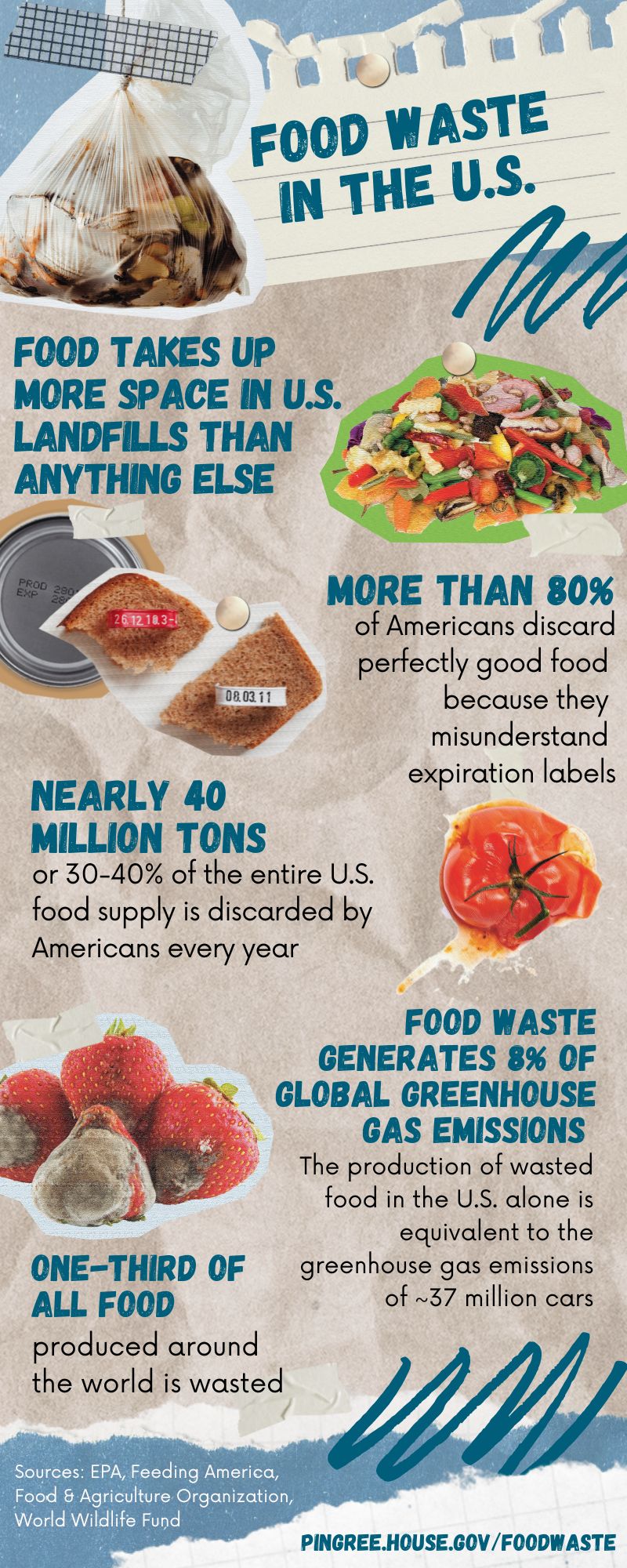The United States wastes a staggering amount of food, resulting in environmental problems, billions in economic costs, and a lost opportunity to help feed the 50 million Americans who are food insecure. In September 2015, USDA, EPA, and FDA announced the first-ever domestic goal to halve food loss and waste by 2030.
My work in Congress to address food waste
White House Conference on Hunger, Nutrition, and Health
I'm proud to lead my colleagues in Congress by pushing legislation to address this problem, including:
|
|
|
|
- The Food Date Labeling Act is a bipartisan bill aimed at making food date labels more consistent and less confusing, so less food is needlessly thrown out.
- The Further Incentivizing Nutritious Donations of Food Act, or FIND Food Act is a bipartisan bill would expand existing and create new tax deductions and credits to better incentive farmers and suppliers to donate food. I introduced the bill with Reps. Shontel M. Brown (D-Ohio), Fred Keller (R-Pa.), and Troy Balderson (R-Ohio).
- The School Food Recovery Act is a bipartisan bill to create a new program at USDA that would provide grants to schools to work on food waste reduction projects. Food waste emits methane, a harmful greenhouse gas, and squanders the water and other resources used to produce and transport the food. This bill will help address the climate crisis and empower students to responsibly reduce food waste.
- The Zero Food Waste Act, which I introduced with Julia Brownley (D-Calif.), and Ann McLane Kuster (D-N.H.) would create a new Environmental Protection Agency (EPA) administered grant program for state, local, tribal, and territorial governments and for nonprofits, which would offer three types of grants: planning grants, measurement grants, and reduction grants.
- The Cultivating Organic Matter through the Promotion Of Sustainable Techniques (COMPOST) Act would add composting as a conservation practice for U.S. Department of Agriculture (USDA) conservation programs and would create new USDA grant and loan guarantee programs for composting infrastructure projects, including both large-scale composting facilities as well as farm, home, or community-based projects.
- The Agriculture Resilience Act is my comprehensive legislation that aims to give farmers the tools they need to become net-zero by 2040 and empower this sector to mitigate the climate crisis. One provision of the bill would standardize food date labeling to reduce consumer confusion and create a new program at USDA to reduce food waste in schools.
- The Food Donation Improvement Act is a bipartisan bill to encourage food donation efforts across the country by extending liability protections to food donors when food is either given directly to a person in need or when a recipient pays a deeply reduced cost.
|
In 2018, I launched Congress’s first-ever Bipartisan Food Recovery Caucus. And the 2018 Farm Bill included my provisions to create the first full-time food loss and waste liaison at USDA, a composting and food waste reduction pilot program, and the Local Agriculture Market Program (LAMP) to reduce on-farm waste.
I'm proud that many food waste initiatives I've been pushing for were included in the House Select Committee on the Climate Crisis's first-ever comprehensive report on climate change, such as the School Food Recovery Act, the Food Date Labeling Act, the Kids Eat Local Act, the Food Recovery Act, and the Agriculture Resilience Act.


